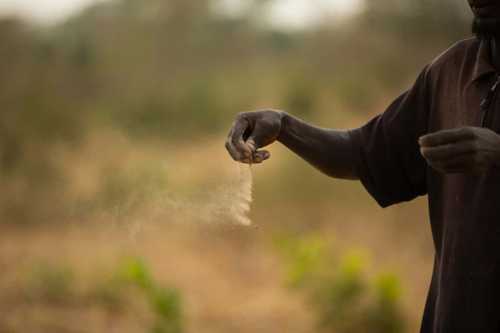
In addition to the wellbeing benefits associated with listening to natural soundscapes, earth.fm’s ever-growing archive of recordings functions as a platform to raise funds for charities across the globe. The organizations that we support work in the regions where rich habitats are represented by the most valuable nature sounds. In their struggles to conserve the natural world, they all work according to the following approaches:
- Collaborating with local communities which have deep knowledge of local context
- Minimizing of overhead costs and bureaucracy
- Using science-based methodologies
- Being easy-going and transparent
- Not viewing nature as a machine.
They also all avoid oversimplified goals; rather, they draw on local knowledge to work in holistic ways which take whole landscapes and ecosystems into consideration.
Here, we will run through the organizations we currently support whose work includes projects based in Kenya. All of these charities were originally chosen by recordists who have contributed soundscapes to the site.
The East African Republic of Kenya scrapes into the top 50 largest countries on Earth, and its size encompasses habitats which range from tropical and temperate regions – including forested areas and mangrove swamps – to deserts and glaciated snowy mountains (including Mount Kenya, the second-tallest peak on the continent). As of 2011, crops and pasture account for nearly 40% of land use, while forest occupies just 6% (making it one of the least-forested countries in Africa).
Key areas include the Great Rift Valley (long considered a crucial site of human evolutionary emergence) and the Maasai Mara, the site of a large-scale migration which includes more than one million wildebeest and 200,000 zebras each year. Other charismatic mammalian megafauna found in the country include lion, cheetah, leopard, elephant, giraffe, hippopotamus, and rhinoceros, as well as Nile crocodile and birds such as flamingo and ostrich.
However, despite this wealth of species, in 2019 Kenya scored just 4.2 out of 10 in the Forest Landscape Integrity Index, which measures the extent of anthropogenic modification, placing it 133rd of 172 countries.
Further environmental issues affecting the country include:
- Water shortages, for example due to the Gilgel Gibe III Dam and sugar plantations’ demands for water
- Water quality degraded by industrial waste and the increased use of pesticides and fertilizers, and by its use for hydroelectric power
- Seasonal flooding which has been exacerbated by climate change. In 2021, house and schools were submerged and crops destroyed, displacing thousands of people, causing mudslides, and contaminating numerous water sources from the overflow of latrines
- Drought: alterations to the typical period of rainfall, also caused by climate change, has meant that previously decennial droughts now occur every year
- Deforestation: approximately 50 square kilometers of forest are lost each year. This overexploitation of resources is partly driven by the prevalence of poverty, which has led to trees being cut down for logging, charcoal burning, in order that land may be cultivated, or to clear space for illegal settling
- Soil erosion (which is aggravated by loss of trees)
- Desertification
- Littering and inadequate waste collection and disposal
- Domestic and industrial pollution
- Poaching: together with trophy hunting, this is one of the principal threats facing animals already endangered by habitat reduction. Law enforcement agencies use ‘green militarization’ to attempt to tackle illegal poaching, and public ivory burnings have been carried out as a deterrent since 1989 (making Kenya the first country to do this). However, the prevalence of illegal poaching derives from systemic failings: Kenyans living in poor conditions (largely as a result of the country’s colonial history) are alienated from conservation due to national parks having been built for European settlers, and may have few alternative ways to generate sufficient income.
Such a varied and substantial range of issues clearly necessitates a robust and committed response on multiple fronts, and that is what the following charities are providing:
Eden Reforestation Projects
Taking a bottom-up approach by establishing relationships with community leaders who are keen to protect and nurture local natural environments, ERF is able to help “communities to restore forests on a massive scale, thereby creating jobs, protecting ecosystems, and helping mitigate climate change”. Putting communities at the center of the organization’s practice generates long-term commitment to the reforestation process on the part of local people, something fired by the sense of ownership which ERF allows them to feel.
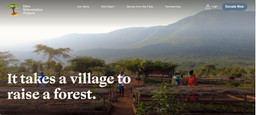
The ERP model provides opportunities for communities to become economically self-sustaining, and its simplicity means that it is reproducible even by those with limited resources. So far, employees numbering nearly 15,000 have been fairly paid to produce, plant, and protect upwards of 977 million trees – nearly one million per day – across 10 countries, with expertise shared across these sites applied flexibly to accomodate any challenges.
Despite being carried out in isolated and politically volatile locations, planting is maintained even in the face of civil wars, civic unrest, extreme weather, earthquakes, landslides, dangerous wild animals, warlords, bandits, and poachers. By necessity, ERP’s team leaders are therefore people “willing to catch a four-foot-long iguana, deter elephants from trampling nurseries, and handle being held at gunpoint by thugs”.
Workdays for teams in Kenya include choices like whether to traverse python-infested bushes or hyena territory. Nevertheless, more than 1,000 employees have planted upwards of 50 million trees in the country – despite only starting work in Kenya in 2019, with planting commencing during the covid pandemic. Planting is taking place in mangroves and northern coastal forest, and in the Great Rift Valley, where it will re-establish habitat for wildlife, landslide protection, and create sustainable economic opportunities and a dependable water supply for local people. In this way, Eden Reforestation Projects is helping Kenya to achieve its commitment to attain 10% forest cover through reforestation.
Donate here.
International Tree Foundation
Founded by Dr Richard St. Barbe Baker and Chief Josiah Njongo almost 100 years ago as Men of the Trees, the International Tree Foundation (ITF; the name was changed in 1992) has boasted chapters in more than 100 countries. As such, it is the world’s oldest tree-planting charity.
Organizations founded or assisted by Baker, a biologist, botanist, and author, have been credited with planting some 26 billion trees across the world. Having been so ahead of his time as to recognize, in the 1920s, the benefits of reforestation, by 1949 Men of the Trees drafted a manifesto including the following, profoundly modern statement:
“We believe in the development of a fuller understanding of the true relationship between all forms of life in order to maintain a natural balance between minerals, vegetation, animals and man. We believe that forests and woodlands are intimately linked with biological, social and spiritual well being.”
Similarly progressively – for 1959 – in the final issue that Baker edited of the Men of Trees journal, he wrote:
“The time has come for our women, the creative element, to take their part in guiding nations. We of the Men of the Trees would welcome women volunteers from every part of the UK to form local branches. If women would like to Change Men of the Trees to Friends of the Trees, as founding member, I would welcome it.”
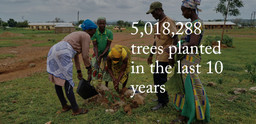
ITF continues the work that Baker started: working internationally “in local communities on a variety of projects centred around reforestation, environmental protection and community-building”. Current projects in Kenya include replanting indigenous trees in the sadly degraded Saiwa Swamp National Park, and the introduction of sustainable agricultural practices.
Donate here.
Reforest’Action
French company Reforest’Action was founded in 2010. Despite its youth, it has made good on its mission statement – “to preserve, restore and create forests around the world in order to develop their multiple environmental, social and economic benefits” – by using its ‘crowdplanting’ model to fund the planting of over 23 million trees in 42 countries.
The crowdplanting system which enables Reforest’Action to fund its work is based on three elements:
- Financiers (who may be individuals or companies)
- The company itself, which choses projects, provides the necessary finances and technical support, as well as monitoring and gauging their ultimate socio-economic and environmental benefits
- Project leaders: experts in their fields who are able to adapt projects according to the realities of local circumstances.
In the forestry projects that Reforest’Action supports, both in France and elsewhere across the globe, quality is guaranteed by adherence to the following principles:
- The maintenance and strengthening of biodiversity and forest ecosystem services such as CO₂ storage, water filtration, soil retention, and population well-being. Species diversity among the trees planted, the presence of habitats for local plants and animals, and measures to ensure that carbon remains locked into soil, “guarantee the development of ecosystem services and the capacities for resistance, adaptation and resilience to environmental disturbances”
- Confirmation that locals’ needs are being met (for this reason, small-scale community projects carried out by a range of stakeholders are deemed preferable)
- Long-term project monitoring of social, economic, biodiversity, and climate impacts, on the basis of international good practice adapted to the specificities of local circumstances
- Having the humility to acknowledge and correct any faulty decision-making in the face of complex interactions across wildly varied environments, according to up-to-the-minute research.
As Stéphane Hallaire, the company’s founder and president, has put it, “It’s not just about planting tree shoots. It’s a much more complex know-how that requires an approach adapted to each terroir, each landscape, each valley on the planet, taking into account its biodiversity and the culture of the local population.”

That know-how comes from a variety of sources, which feed Reforest’Action’s even grander ongoing ambitions to help develop new, sustainable societal models to counter biodiversity loss and the climate emergency:
- Ten years’ experience, gained since Hallaire first planted a tree (a mango, in Senegal)
- The Forest Pole: a unit within Reforest’Action, comprising agricultural engineers, foresters, and technical correspondents, which brings its combined expertise to bear on each project the company takes on
- Two specialized technical and scientific committees which are devoted to strengthening work carried out in both temperate and tropical regions
- Collaboration with institutions worldwide to further large-scale global protection for forests, and their restoration
- Constant monitoring of international scientific work around forestry
- A network of partners, both in France and elsewhere, in order to realize substantial projects.
Reforest’Action’s desire to “strive for continuous improvement and [its conviction] that progress is made along the way” is reflected by its status as a B Corp company – that is, one “verified by [the non-profit network] B Lab to meet high standards of social and environmental performance, transparency, and accountability” – while, since 2020, its projects have been certified by independent control body Ecocert Environnement.
Donate here.
Trees for the Future (TREES)
Ecosystemic collapse and the deterioration of landscapes locks farming families into hunger and poverty. The precarity of this situation can lead them to clear trees and wildlife from their land in an attempt to grow enough produce to eat and to sell. This unsustainable approach to land use, driven by the global food system, harms both people and the planet by intensifying deforestation, soil degradation, and the loss of biodiversity.
Though aware that there is no magic bullet for this situation, TFTF attempts to improve farmers’ lives by providing them with the tools and knowledge to use forest gardening principles – a technique pioneered by smallholding farmer Robert Hart in the 1980s. A consciously low-maintenance agroforestry approach to farming, it is based upon woodland ecosystems and incorporates companion planting to create a layered woodland habitat.
A four-year training program, during which participants plant thousands of trees, teaches them how to do so without using chemical fertilizers or pesticides, and allows the trees to capture carbon and their roots to nourish the soil with nutrients. The sustainability of this system ensures dependable long-term yields from the first year onward. By educating communities in this way, Trees for the Future enables local people to grow vigorous economies and flourishing food systems which contribute to the health of the planet.

It was witnessing the interrelation between poverty and deforestation when volunteering in the Philippines that prompted founders Dave and Grace Deppner to establish Trees for the Future, in 1989. Since then, the charity has planted 278 million trees worldwide, restored 71,000 acres, and given 300,000 individuals regular food and income.
Its current work in nine sub-Saharan African countries has shown that, even in semi-arid countries, agroforestry is an effective solution to degraded soil, nutrient-poor food systems, and farmers’ inability to grow sufficient produce.
Donate here.
Tusk
Over the last thirty years, Tusk (previously Tusk Trust) has worked to support progressive conservation initiatives across the whole of Africa. The organization considers local people best placed to mitigate the negative effects of problems relating to the natural world on the continent, such as conflict between people and animals, poaching, and habitat loss. Tusk has therefore established long-term relationships with donors who are able “to invest in the best grassroots conservation initiatives – helping to increase their profile and maximise their impact” and bolster community education and leadership.
By also partnering with conservationists, Tusk seeks (among other goals) to protect endangered species – with ‘flagship species’ being promoted in order to preserve the other inhabitants of their habitats – and develop ways of tackling the international market for illegal wildlife products. So far, its template for doing so has led to increased protection for over 70 million hectares and upwards of 40 threatened species, and has brought benefits to more than 7.5 million people.
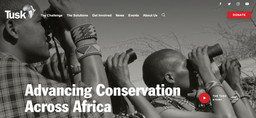
Tusk’s work includes:
- Programs to educate children in the appreciation of the natural world and its significance – ranging from extracurricular activities to the Pan African Conservation Education (PACE) program, which, across 33 countries, has reached more than 500,000 schoolchildren
- Development of projects furthering human-wildlife coexistence, including livestock enclosures which are predator-resistant, discouraging carnivores, and physical barriers to deter elephants from eating or trampling crops
- Supporting the conservation of habitat corridors that link habitats together; habitat restoration (particularly through reforestation); and the management of protected areas, for example via the use of park rangers and community-led conservancies.
In Kenya, these conservancies cover more land than national parks. In northern Kenya, one of Tusk’s partners, the Northern Rangelands Trust (NRT), develops community wildlife conservancies which allow the maintenance by locals of their traditional lands and natural resources. In addition, rangers monitor and protect wildlife and act to prevent banditry and livestock rustling, while a ‘Peace Team’ “works to resolve tensions between ethnic groups which have historically lead [sic] to frequent conflicts”. In addition, the NRT helps to set up partnerships with the tourism sector and runs a traditional craft business which provides more than 1,200 local women with an income.
Ultimately, Tusk aims to shape “a tomorrow where the people of Africa can reconnect with nature, understand its inherent value and protect it for future generations”.
Donate here.
Wildlife Conservation Society
Established in 1895 as the New York Zoological Society, this worldwide conservation organization’s long history has led to its current position managing hundreds of conservation projects across almost 60 countries, from Afghan mountains to the Chilean archipelago of Tierra del Fuego. To guarantee these projects’ protection, the WCS collaborates with bodies which range from local and Indigenous communities to government agencies, intergovernmental organizations, nongovernmental organizations, multilateral entities such as the United Nations, other conservation organizations of all sizes, and the private and philanthropic sectors.
In New York, over 400 million guests have visited the zoos which the WCS runs – the Bronx Zoo, Central
Park Zoo, Prospect Park Zoo, Queens Zoo, and the New York Aquarium – which emphasize the inspiration of “empathy and a sense of urgency and action”, prompting further support of worldwide field conservation via advocacy and financial support.
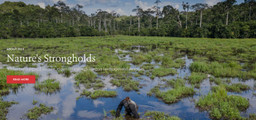
In addition, WCS invests in “long-term, results-based” programs of conservation, using its science-based approach and global experience to support its goals. Its focus is on the conservation of wild spaces in 14 high-priority areas which account for more than half of the biodiversity on Earth. Having protected wildlife and wild places for more than 100 years, WCS aspires to use its experience of field, zoo, and aquarium contexts “to set the bar for science, conservation action, and education”, and to galvanize appreciation of the value of the natural world, despite the increasing challenges in these fields. Ultimately, it aspires to help realize a world of flourishing ecosystems “valued by societies that embrace and benefit from the diversity and integrity of life on earth”.
The rate of human population growth is declining on most continents and is projected to stabilize over the next hundred years (partly due to the effect of increasing education and empowerment of women). The WCS sees this trend as a potential catalyst “for a renaissance of nature”. In order to enable this possibility to become a reality, the organization supports various countries to enact the UN General Assembly’s Sustainable Development Goals, the Convention on Biological Diversity, and the Convention on International Trade in Endangered Species of Wild Fauna and Flora (CITES).
Staff including biologists, curators, zookeepers, veterinarians, and educators “have dedicated their lives to understanding and improving the health of the planet”, and the WCS continues to be dedicated to magnifying the effects of its work in order to safeguard “nature’s strongholds—those wild places on land and in the sea that are most important for wildlife and are sufficiently intact to maintain their ecosystems and biodiversity long term.”
Donate here.
Thank you for your interest in conservation, rewilding, protecting biodiversity, and other environmental protection projects!
We’re always interested in hearing about additional projects and organizations taking practical steps towards healing our planet – please feel free to share any details with us!
Earth.fm is a completely free streaming service of 1000+ nature sounds from around the world, offering natural soundscapes and guided meditations for people who wish to listen to nature, relax, and become more connected. Launched in 2022, Earth.fm is a non-profit and a 1% for the Planet Environmental Partner.
Check out our recordings of nature ambience from sound recordists and artists spanning the globe, our thematic playlists of immersive soundscapes and our Wind Is the Original Radio podcast.
You can join the Earth.fm family by signing up for our newsletter of weekly inspiration for your precious ears, or become a member to enjoy the extra Earth.fm features and goodies and support us on our mission.
Subscription fees contribute to growing our library of authentic nature sounds, research into topics like noise pollution and the connection between nature and mental wellbeing, as well as funding grants that support emerging nature sound recordists from underprivileged communities.

